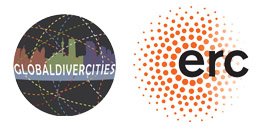
GLOBALDIVERCITIES - migration and new diversities in global cities

Comparatively conceiving, observing and visualizing diversification in urban public spaces
Enabled by an Advanced Investigator Grant from the European Research Council (ERC) to Prof. Vertovec, the GlobaldiverCities project is able to undertake simultaneous, multi-disciplinary comparative research in three significant contexts undergoing rapid diversification.
The project’s core research question is: In public spaces compared across cities, what accounts for similarities and differences in social and spatial patterns that arise under conditions of diversification, when new diversity-meets-old diversity? The project entails qualitative research in three contexts of super-diversity: New York (a classic city of immigration with new global migrant flows in a broadly supportive political context), Singapore (dominated by racial-cultural politics, and wholly dependent on new, highly restricted migrants), and Johannesburg (emerging from Apartheid with tensions around unregulated new, pan-African migrant flows). A twelve-person team plus local expert advisors span anthropology, sociology and human geography. In order to research the changing nature of diversity and its socio-spatial patterns, strategic methods entail ‘conceiving’ (exploring how old and new diversities are locally understood), ‘observing’ (producing ethnographies of interaction) and ‘visualizing’ (using photographs, film and innovative data mapping).
In addition to academic articles, an edited volume and a theoretical monograph drawing on the data, GlobaldiverCities will produce five films: one on new diversities, spatial dynamics and interactions within each city, one comparing the three localities, and one on the project itself, its scope, methods and development.
The GlobaldiverCities Project
GLOBALDIVERCITIES (22 min)
By Doerte Ulka Engelkes
A film documentary about the GlobaldiverCities research project
(see http://www.aaanet.org/profdev/ethics/upload/Statement-on-Ethics-Principles-of-Professional-Responsibility.pdf).